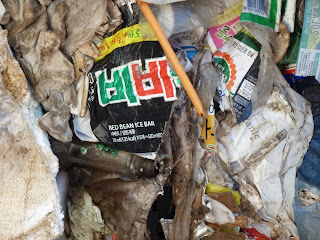Quiapo Shoppers Warned vs. Buying Cheap Imported Food Items with Tampered Expiry Dates or Damaged Labels
Amid the spate of food poisoning incidents during
the recent weeks that downed over 2,000 child victims across the country, the
EcoWaste Coalition cautioned bargain shoppers against buying imported food
items with dubious expiry dates or torn labels that are sold in Quiapo, Manila
at rock-bottom prices.
The group, which has been raising public awareness about
hazardous products and wastes and pushing for policy and law enforcement actions,
issued the warning as health authorities announced a food poisoning outbreak in the Caraga Region in Mindanao due
to the consumption of tainted durian candies.
“Our market monitoring in Quiapo over the weekend,
particularly in Villalobos Street, shows that some vendors are selling
manufactured food products with tampered expiry dates or damaged labels at incredibly low prices. Bargain hunters should exercise
caution when buying cheap but adulterated or mislabelled food items that could
put the health of family members, especially the kids, at grave risk,"
stated Thony Dizon, Coordinator of the EcoWaste Coalition’s Project Protect.
For example, the manufacturing and expriry dates on the
wrapper of a milk chocolate coated biscuit made in France has been erased. The product is sold for just P20 per box of
six packets.
A small pack of a popular brand of chewing gum costing
P31.50 in supermarket is sold for P5 only.
However, the discounted product bears no machine-printed expiry date
unlike the one sold at a formal retail store.
Another example is a pudding snack made in Taiwan that is
sold for P20 per bag of 12 jelly cups with its original “best before” sticker
removed.
“We also found nougat candies from Canada, mint-flavored
chewing gums from China, chocolate cookies from Indonesia and fruity chews from
Thailand without the automated machine-printed expiry dates,” Dizon said.
“We fear that the authenticity and safety of such food
products with expiry date stickers generated from a mere tagging device could
not be fully relied on and that consumers may be mistakenly consuming adulterated foods that can cause food poisoning,” he
added.
“A food shall be deemed adulterated if it has passed its
expiry date” under Article 23 of the Consumer Act of the Philippines.
“We also saw other suspicious food items such as bottled
oyster sauce with its label removed, canned fruit and soup with torn labels, as
well as repacked chocolate and fruit powder and three-in-one coffee with zero labelling information,” he said.
Article 40 of the Consumer Act prohibits “the
adulteration or misbranding of any food” and “the alteration, mutilation,
destruction, obliteration, or removal of the whole or any of the labelling of”
(the product) “and results in such product being adulterated
or mislabelled.”
“To prevent potential poisoning cases due to the consumption
of adulterated or mislabelled food items, we urge the Manila Health Department
to look into this matter and take urgent law enforcement action. It’s best to take action now than be sorry
later,” Dizon suggested.
Violators of the law’s Article 40 shall, upon conviction,
be imprisoned from one to five years, or fined P5,000 but not more than P10,000,
or get jailed and fined as decided by the court.
-end-
Reference:
http://www.chanrobles.com/republicactno7394.htm#.VaDnWPnt2ko








Comments